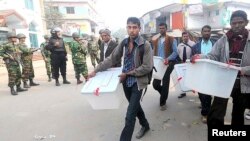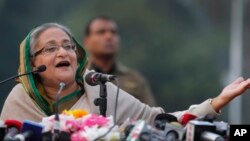NEW DELHI —
Bangladesh has held a general election marred by a low voter turnout and clashes which have killed at least 18 people. The ruling Awami League party is assured of victory due to an boycott by opposition parties, but that could deepen the political gridlock in the country.
A text message by the Election Commission asking people to go out and vote without “fear and hassle” had little impact on voters as violence wracked Bangladesh Sunday.
Scores of polling booths, mostly in rural areas, were attacked or set on fire by opposition activists hurling homemade explosives. One polling officer was reported beaten to death. Several other people were killed in clashes between police and protesters out to disrupt the election. Voting was suspended in some areas.
The main opposition Bangladesh Nationalist Party boycotted the election along with several other parties and urged voters to shun the polls. But it was not just that call or the fear of violence which kept voters away.
Ruling Awami League candidates have won more than half the seats up for election because they were unopposed.
Baidul Alam Majumdar of the Citizens of Good Governance in Dhaka is among those who did not need to vote because the candidate in his constituency had no challenger. He says most people considered the polls pointless because they were denied a choice.
“Usually the mood in elections of Bangladesh is very festive," he said. "The fact that the voter turnout is very, very low indicates that people have no interest and people do not think that this is an election they should go to vote for and it is not worth voting for. People are very concerned, very apprehensive, there is widespread violence.”
Television stations showed several polling stations that were nearly empty.
The opposition boycott was triggered by the government’s refusal to heed demands that elections be held under a neutral caretaker government as has been past practice. The Bangladesh Nationalist Party has led strikes and blockades since the elections were called.
In a recent televised address, Prime Minister Sheikh Hasina said she tried to bring the opposition into the election, but they spurned her offer of dialogue.
There are fears that the political turbulence will intensify after the vote.
Ataur Rahman, a professor of politics with Dhaka University, says the voter turnout Sunday could be the lowest in the country’s history, and this will encourage the opposition to press for new elections.
“The opposition parties have got the message that people have rejected or the people have no support of this kind of election. So I think they will capitalize on it and continue their movement, unless this government, they declare the election cancelled,” says Rahman.
The international community, which refused to send observers, has also questioned the legitimacy of Sunday’s polls.
Lisa Curtis, senior research fellow for the Asia Studies Center at the Heritage Foundation in Washington says Bangladeshis will not see this as a fair election.
“I think this is a very unsettling situation," she said. "Look we are having election, where the main opposition party is not participating, most of its allies are not participating, both the EU and U.S. have said they will not send election observers, you have the main opposition leader Khaleda Zia basically under house arrest.”
Political analysts in Bangladesh say the new government will have no moral authority, and will have to consider negotiations with the opposition to end the political impasse.
A text message by the Election Commission asking people to go out and vote without “fear and hassle” had little impact on voters as violence wracked Bangladesh Sunday.
Scores of polling booths, mostly in rural areas, were attacked or set on fire by opposition activists hurling homemade explosives. One polling officer was reported beaten to death. Several other people were killed in clashes between police and protesters out to disrupt the election. Voting was suspended in some areas.
The main opposition Bangladesh Nationalist Party boycotted the election along with several other parties and urged voters to shun the polls. But it was not just that call or the fear of violence which kept voters away.
Ruling Awami League candidates have won more than half the seats up for election because they were unopposed.
Baidul Alam Majumdar of the Citizens of Good Governance in Dhaka is among those who did not need to vote because the candidate in his constituency had no challenger. He says most people considered the polls pointless because they were denied a choice.
“Usually the mood in elections of Bangladesh is very festive," he said. "The fact that the voter turnout is very, very low indicates that people have no interest and people do not think that this is an election they should go to vote for and it is not worth voting for. People are very concerned, very apprehensive, there is widespread violence.”
Television stations showed several polling stations that were nearly empty.
The opposition boycott was triggered by the government’s refusal to heed demands that elections be held under a neutral caretaker government as has been past practice. The Bangladesh Nationalist Party has led strikes and blockades since the elections were called.
In a recent televised address, Prime Minister Sheikh Hasina said she tried to bring the opposition into the election, but they spurned her offer of dialogue.
There are fears that the political turbulence will intensify after the vote.
Ataur Rahman, a professor of politics with Dhaka University, says the voter turnout Sunday could be the lowest in the country’s history, and this will encourage the opposition to press for new elections.
“The opposition parties have got the message that people have rejected or the people have no support of this kind of election. So I think they will capitalize on it and continue their movement, unless this government, they declare the election cancelled,” says Rahman.
The international community, which refused to send observers, has also questioned the legitimacy of Sunday’s polls.
Lisa Curtis, senior research fellow for the Asia Studies Center at the Heritage Foundation in Washington says Bangladeshis will not see this as a fair election.
“I think this is a very unsettling situation," she said. "Look we are having election, where the main opposition party is not participating, most of its allies are not participating, both the EU and U.S. have said they will not send election observers, you have the main opposition leader Khaleda Zia basically under house arrest.”
Political analysts in Bangladesh say the new government will have no moral authority, and will have to consider negotiations with the opposition to end the political impasse.














